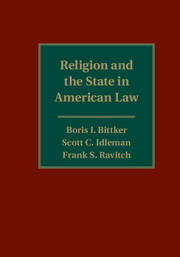Book contents
- Frontmatter
- Dedication
- Contents
- Preface
- 1 History and Introduction
- 2 Church and State in the Nineteenth Century
- 3 Religious Influences and Expressions in Law and Government
- 4 The Establishment Clause
- 5 The Free Exercise Clause
- 6 The Religious Test, Equal Protection, and Free Speech Clauses
- 7 The Definition of Religion
- 8 Church Property Disputes and Church Schisms
- 9 Contracts
- 10 Taxation
- 11 Employment
- 12 Land Use
- 13 Torts
- 14 Criminal Law and Process
- 15 Family Law
- 16 Public Education
- 17 Religious Symbolism on Government Property
- 18 Special Contexts: Prisons and the Military
- Appendix A Federal Constitutional Provisions
- Appendix B State Constitutional Provisions
- Appendix C Selected Federal Statutes 910
- Index
11 - Employment
Published online by Cambridge University Press: 05 October 2015
- Frontmatter
- Dedication
- Contents
- Preface
- 1 History and Introduction
- 2 Church and State in the Nineteenth Century
- 3 Religious Influences and Expressions in Law and Government
- 4 The Establishment Clause
- 5 The Free Exercise Clause
- 6 The Religious Test, Equal Protection, and Free Speech Clauses
- 7 The Definition of Religion
- 8 Church Property Disputes and Church Schisms
- 9 Contracts
- 10 Taxation
- 11 Employment
- 12 Land Use
- 13 Torts
- 14 Criminal Law and Process
- 15 Family Law
- 16 Public Education
- 17 Religious Symbolism on Government Property
- 18 Special Contexts: Prisons and the Military
- Appendix A Federal Constitutional Provisions
- Appendix B State Constitutional Provisions
- Appendix C Selected Federal Statutes 910
- Index
Summary
At the beginning of a new millennium, employment discrimination on the basis of religious affiliation remains a problem in the United States. Even though Europeans settled here to escape religious persecution, the Equal Employment Opportunity Commission (EEOC) reported that it had received 3,811 allegations of employment discrimination on the basis of religion in 2012. This figure accounted for 3.8 percent of the agency's total caseload for the fiscal year. Although this number is small in comparison with other categories, such as discrimination based on sex (30,356 allegations) or race (33,512 allegations), the allegations of religious discrimination in employment have doubled since 1997, the first year for which statistics are available on the agency's website. Of special concern is the increase in allegations of discrimination made by Muslims since the terrorist attacks of September 11, 2001.
Although a complete review of law regarding religion and U.S. employment would take multiple volumes, this chapter summarizes the history of and recent trends in two aspects of the law in this area. The first section of this chapter surveys laws and case precedent that protect working religious adherents who claim discrimination, harassment, or a failure to accommodate. Adherents now bring most of their claims under Title VII of the Civil Rights Act of 1964 or equivalent state fair employment practice statutes. However, isolated legislation, some arguably politically as well as religiously motivated, offers additional protections. Recently passed “refusal clauses,” also known as “conscience clauses,” relate to the sale of contraceptives or the provision of pregnancy-termination services. They highlight the importance of targeted and specific statutes. Burwell v. Hobby Lobby Stores, Inc. addresses whether for-profit, private employers enjoy the same protections afforded by the Religious Freedom Restoration Act of 1993 (RFRA) that religions may claim against governmental interference.
The second section of this chapter covers the protections for religious institutions that also operate as employers. The Supreme Court's 2012 decision in Hosanna-Tabor Evangelical Lutheran Church and School v. E.E.O.C. indicates that the legal debate concerning the separation of church and state remains lively – at least where religious employers operate. The future direction of Court interpretation of that precedent remains obscure. Some analysts suggest that the Court limited Hosanna-Tabor's reach, whereas others contend that its influence may be quite extensive. This chapter concludes with several observations about the evolution of religion and employment law.
- Type
- Chapter
- Information
- Religion and the State in American Law , pp. 451 - 503Publisher: Cambridge University PressPrint publication year: 2015



